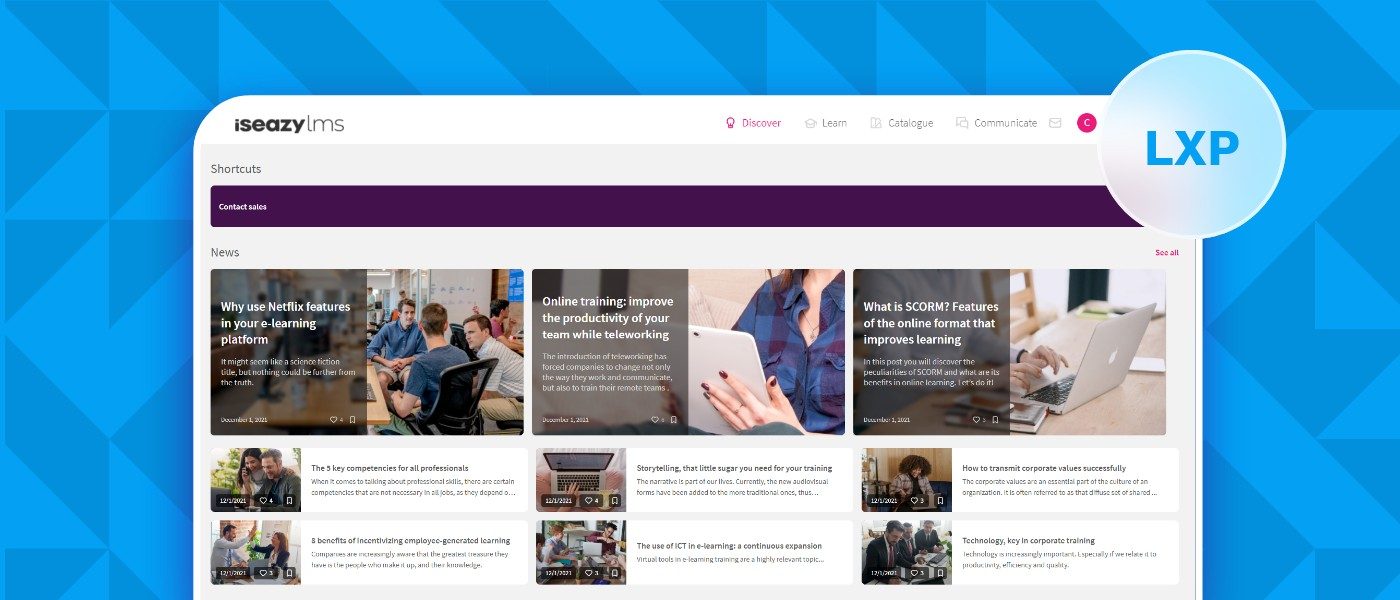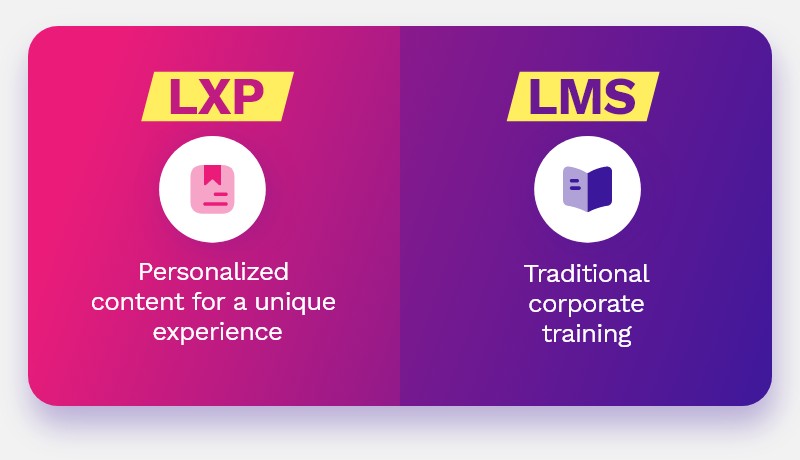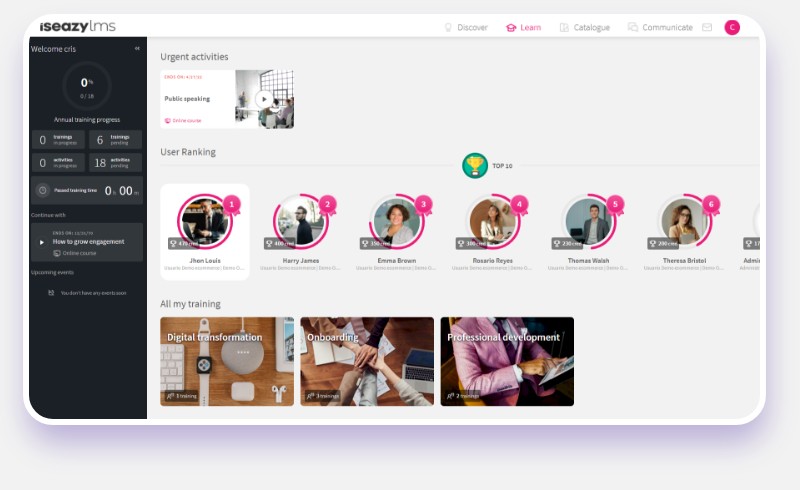Table of contents
ToggleThe use of new technologies in the workplace has changed the traditional forms of corporate training. In addition to face-to-face training, new learning methods have emerged that can adapt to the needs of new professional profiles.
Microlearning or gamification are some of these new forms of learning that have provided organizations with a 360º training model. Employees no longer simply receive information but can learn from different sources, receive personalized recommendations from other users, or even benefit from programs that work with Machine Learning.
In this new complex training ecosystem, where traditional LMS is no longer suited for modern learners, LXP has emerged. But what is an LXP or Learning Experience Platform, and how can it improve your corporate training?
What is a Learning Experience Platform (LXP)?
LXPs were created to offer each user a unique and personalized training experience. Through cloud-based software using artificial intelligence and machine learning, new collaborative learning possibilities have arisen in an engaging and personalized way. Now, each professional can quickly and easily access the training answers they need whenever they want.
According to Josh Bersin, LXPs allow us to bring content to the user in an appealing and complementary way. It is a reliable information delivery system that makes modern content easier to engage with.
Characteristics of an LXP
- User-friendly interface
Like streaming platforms, LXPs provide an easy-to-navigate, intuitive, and modern look and feel, which allows customization of the learning experience. Users can search for information based on their tastes, create their own lists or include internal or external content. In addition to providing relevant content, an LXP monitors employee progress so that the user can manage their training.
- Social Learning
In an LXP, social interaction runs throughout the entire learning experience. Users build relationships in a cross-cutting way that helps them gain more knowledge, fosters collaboration among users, offers responsiveness and agility in the processes, and even saves time and lower costs.
Learning Experience Platforms understand learning as a network of interconnected users rather than a community of isolated individuals.
- Personalized learning
In an era where personalized recommendations dominate all social platforms, employees may be frustrated if they receive a different level of personalized attention in the workplace.
LXPs are 100% user-centered and offer lists based on historical data, employee information, and interests. This level of customization improves training efficiency while making it easier for administrators by not having to recommend courses manually.
- Modern Learning
In an LXP platform, content is crucial. Unlike the old LMS, where the content was more limited (courses, training itineraries, standards such as SCORM, xAPI, or LTI) and was managed exclusively by the administrator, in an LXP, the formats have been expanded (courses, podcasts, videos, posts, blog, etc.). Users can add or curate content that they find interesting for their training. It is a tool that offers a truly modern learning experience.
- Fully responsive
Almost 70% of the time we spend browsing the internet is done from our phones, making it essential for companies to reach their workforce through mobile devices.
Unlike an LMS, which traditionally distributes content, an LXP offers a mobile learning experience that employees can use whenever they need it. They can log into the application and start training instantly.
- Business Intelligence
Business Intelligence tools and strategies transform data into information and information into knowledge. These new platforms provide more significant data insights, such as usage, engagement, and training measurement, thanks to BI functionalities that optimize decision-making and improve training efficiency.
Differences between an LMS and an LXP
As you already know, an LMS or Learning Management System is an online learning software that allows you to manage, organize, create and distribute online learning material. But how is it different from an LXP?
Who is the target audience?
In an LMS, the content uploaded is designed according to specific characteristics, such as a professional profile, a job position, a department, or a geographic location. That’s why this type of platform offers a learning approach that is more oriented towards training a group of professionals.
An LXP, on the other hand, adapts to the user and offers them content based on their interests or activities on the platform. LXPs offer a more tailor-made and flexible training approach, allowing users to add content.
The learning experience
An LMS generally offers a learning experience based on courses or training processes where each user acquires knowledge and receives certification. These platforms also track each user’s progress and run performance reports.
As for LXPs, they take the training experience a step further, enriching these online courses with different resources such as microlearning, or allowing content from other service providers to be added, essentially providing more content and, therefore, a complete learning experience.
The type of content
With LXPs, learners take on the role of both content creators and end users. In an LMS, the administrator creates the content, and the user just interacts.
LXPs do away with the figure of teacher or trainer and replace it with users wich obtain a high degree of responsibility. The more valuable content these users generate, the more powerful the platform will be. This is why in an LMS, the content is passive, and in an LXP, it is active.
The learning environment
LXPs offer more dynamic, flexible, and personalized learning environments since users can decide what content to engage with, when, and how. On the other hand, an LMS has a more restricted environment when acting as a content curator, even if it is open to external content.
#7 Benefits of using an LXP for business training
1. They work seamlessly
LXPs have a highly intuitive interface that streamlines navigation through the platform. And it is precisely this speed that motivates the modern learner since they tend always to be busy and want instant access to information.
2. They improve productivity
These platforms offer users specific training content and tools to grow professionally and improve their competencies and skills. It also helps increase the company’s productivity and competitiveness.
3. They provide a personalized experience
LXPs uses artificial intelligence and machine learning to suggest content based on the interests and interactions of each user on the platform. This is an advantage for companies since the platform aligns learning resources with the professionals’ needs, leaving the choice of courses or learning materials in the hands of the user rather than the company.
4. They are accessible
LXPs allow professionals to access content from wherever they are and anytime because they offer an on-the-go experience. This improves efficiency and decision-making at work since it helps them resolve doubts by consulting or reviewing certain aspects of the training.
5. They improve engagement
LXPs improve professionals’ commitment to training by providing better quality and variety in formats, topics, and courses. They are interactive and immersive platforms that allow users to navigate through various content, such as videos, games, quizzes, and personalized activities for each user’s professional growth program.
6. They promote social learning
Each user can interact with different e-learning content, leave comments, share content or create forums to interact with other members of their team or the organization, which generates a social learning experience where the employee is motivated by the learning environment.
7. They lower costs and increase ROI
Companies that promote continuous learning improve their productivity and, in turn, obtain greater profits. An LXP lowers the costs associated with content creation and face-to-face training. Still, more importantly, by generating a high impact on employee performance, they also increase the return on investment in training.
Why choose when you can have it all?
LXPs are undoubtedly becoming the popular choice for many companies’ corporate training thanks to their emphasis on employee experience and new ways of working. But the extensive management functionalities offered by an LMS still remain a priority for others who wish to play a more active part in the management of their training materials.
isEazy LMS is a new generation of LMS, developed to combine the best of both platforms. By offering a unique, personalized, and user-centered learning experience, it encapsulates the benefits of an LXP but also allows you to manage all your training and corporate knowledge processes together in a single platform. Ready to try it for yourself? Start your free trial.















